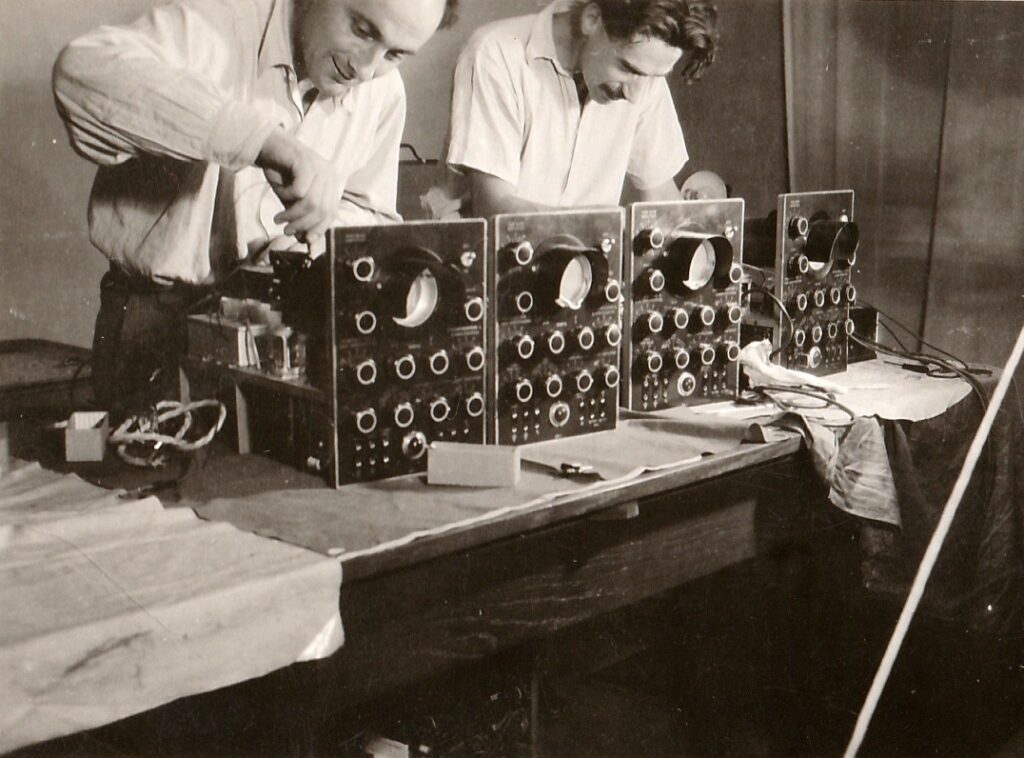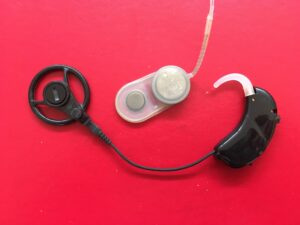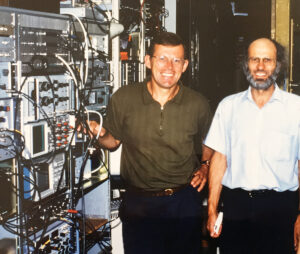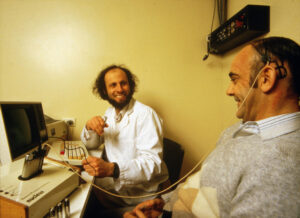Peter Seligman
My name is Peter Seligman and I was born in 1944. My father Richard Seligmann escaped from Czechoslovakia five months before the beginning of the war. The Nazis were already in control and he had difficulties to get Gestapo permission to leave. Eventually he managed but only after jumping off a moving train and running across the fields in Holland. After arriving in England Richard got his girlfriend (my mum Lise) and other friends out too. They lived for a time on a commune in West Hoathly in the country at kindness of the Lady of the Manor, Ursula Ridley.
Initially the refugees were not allowed to work in Britain but in due course Richard was able to join the RAF. He did not want to be associated with the Czech forces in exile because he was very much in their bad books. He had spent time in jail in Terezin for helping political prisoners while he was posted as a guard there under his Military Service. The war, as was often the case, made Richard. Until then he had few prospects.
Towards the end of the war, he seconded to the BBC.

With the RAF (Royal Air Force) Richard trained as a Radio engineer, a discipline at which he excelled. Towards the end of the war, he seconded to the BBC. The mission was to take 40 tons of Radio Broadcasting equipment to Prague to re-establish broadcasting there. It was assumed that the facilities would have been destroyed. But Western Europe was still occupied by the Nazis so the convoy went from Liverpool far out into the Atlantic before coming through the straights of Gibraltar and on to Egypt. They travelled by train through the Middle East and approached Czechoslovakia from the East. Richard reached Prague only days before his father was shot at the window of the apartment by a German sniper from the Sokol (gymnasium) in the park opposite. Here’s the weird thing: of my grandparents, the three Jewish ones went to Terezin and survived whilst the other grandfather, the only Catholic died.
I was born in Great Britain but the family returned to Czechoslovakia shortly after. We lived there until 1948 but my parents, wanted to move to the furthest place on the planet from Europe. That was New Zealand but my grandmother Adele had a sister Emmi in Melbourne, so we came here. Adele’s other 5 siblings and their spouses all died in the concentration camps – mostly in the gas chambers of Auschwitz.
We arrived to Australia by plane and I remember that flight because the pilot sat me on his knee! I have no real memories on my early childhood in Czechoslovakia. My father and a Czech friend we met on the trip set up a manufacturing business here and were quite successful. In Czechoslovakia after the war, Richard and another friend made oscilloscopes (electronic test equipment). He planned to make oscilloscopes in Australia but found you couldn’t even buy a suitable soldering iron. So Lise said “why not make soldering irons?” They did and their soldering irons because the industry standard. They made lots of other equipment but the soldering irons were their bread and butter line. The factory employed mostly Eastern Europeans with a sprinkling of Aussies.
When we arrived in Australia my only language was Czech but when I started school I forgot it – within 6 months I think. Learning English was a non-event. My parents, although they were completely trilingual, were nominally German speaking as were my grandparents. They were Jewish but atheist and non-practicing Jews. They were only dimly aware of being Jewish until the stark reality during the war was forced on them.
In Australia, we associated with both Czech and German communities. We had many Czech visitors including the Smetana Quartet who came quite a few times between 1957 and 1979.
I designed the first portable Speech Processor for the University of Melbourne
The Electrical Engineering, initiated by the war and the RAF continued in our family and I became an Electrical Engineer myself, obtained a PhD and joined the team that developed the Melbourne cochlear implant (Bionic Ear). I worked in the field for 30 years. I designed the first portable Speech Processor for the University of Melbourne device, joined Cochlear Ltd (Nucleus) and we reduced the size of the speech processor from a wall full of equipment to something that could be worn behind the ear like a hearing aid. As a result, my name is on over 20 patents. Cochlear is overwhelmingly the world’s biggest manufacturer of Bionic Ears. Electrical engineering continues in our family – both our sons are electrical engineers.
I visited Czechoslovakia in 1963, 1977 and 1993, have seen the three most recent phases of Czech history. In fact, our family were there at the cusp of the separation of the Czech and Slovak parts. Czech cuisine still features in our family and our sons can cook švestkové knedlíky (fruit dumplings), houskové knedlíky (bread dumplings) and buchty (fruit or poppy seed buns). My wife Maria is from Trieste so her cuisine overlaps with my family’s. She’s a great cook as well. Skiing has always been popular with the Seligman family from pre-war times to the present. Most of our skiing companions have been Czech.







Mark White
Lovely write-up Peter. Thank you!
Tomas Cerny
It is good that this story is published and that Immigration of people were able to immigrate to Australia and the children of the Immigrants have and continue to give their knowledge to this country with out strings attached.
Yes Peter has and continues to give ideas and make the possabilities hearing and give the chance to comunicate to people who in the past lived in a silent world. Many thanks . Tom